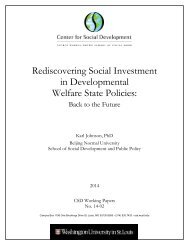Exploring and Assessing Intercultural Competence - Center for ...
Exploring and Assessing Intercultural Competence - Center for ...
Exploring and Assessing Intercultural Competence - Center for ...
You also want an ePaper? Increase the reach of your titles
YUMPU automatically turns print PDFs into web optimized ePapers that Google loves.
<strong>Exploring</strong> <strong>and</strong> <strong>Assessing</strong> <strong>Intercultural</strong> <strong>Competence</strong><br />
30. perceptive /2 2/2 1/1<br />
31. tolerates ambiguity 1 1/1 1/4<br />
32. other qualities (none listed)<br />
Note that items 1 <strong>and</strong> 4 differ in presentation from the others since both are stated in the negative; other<br />
items are all stated in the positive. For example, item 1 (intolerance) remains almost the same with most<br />
claiming 0 intolerance (1 initially <strong>and</strong> 4 at the end, but since 0 is still 0, there is no change). On the<br />
other h<strong>and</strong>, 2 individuals rated themselves at the 1 (or low level of intolerance) at the beginning <strong>and</strong><br />
only 1 did so at the end; hence a minor shift is noted. Item 4 (lack of humor) can be read similarly: 2<br />
volunteers rated themselves at a 0 level at the beginning <strong>and</strong> 3 did so at the end; again still 0 <strong>and</strong><br />
there<strong>for</strong>e no change. Another rated self at the low level of 2, but at the end only 2 rated themselves at 1<br />
so some slight shift occurred in how they saw changes in their own sense of humor.<br />
All remaining items show a general upward shift on the scale suggesting positive changes in the<br />
development of each quality. Of course a better comparison could be made between beginning <strong>and</strong> end<br />
of sojourn had all volunteers completed the entrance <strong>for</strong>m. What is clear, however, is that no volunteer<br />
indicated reversal in any attribute. [It should be noted that respondents did not have access to their<br />
original assessments when completing end-of-program <strong>for</strong>ms.]<br />
Additional evidence of growth <strong>and</strong> development is revealed through volunteer comments made in openended<br />
responses in the <strong>for</strong>ms <strong>and</strong> in interviews conducted at the end of the program:<br />
Open-ended responses in survey <strong>for</strong>ms<br />
- I now have a more open mind. I’m going to appreciate nature even more. (SV4)<br />
- I always develop <strong>and</strong> get to know myself better (SV3<br />
- I have new perspectives on issues important in Ecuadorian culture (BV6)<br />
- I improved my language skills<br />
- I increased my confidence in dealing with other cultures (BV6)<br />
Comments made during exit interviews<br />
(BV6+I) “Communication, which means not only to speak but also to listen <strong>and</strong> watch<br />
differences <strong>and</strong> characteristics of different background people without being judgmental. It is also<br />
important to be patient <strong>and</strong> to underst<strong>and</strong> people from other cultures”<br />
- communication<br />
- watch differences<br />
- non-judgmental<br />
- patience<br />
- underst<strong>and</strong>ing<br />
(SV3+I) “(I learned that) the most important thing towards intercultural success is not to be<br />
judgmental since many things at the host culture differ”<br />
- non-judgmental<br />
- recognize differences<br />
- reasoning<br />
- patience<br />
- self-development<br />
- independence<br />
<strong>Center</strong> <strong>for</strong> Social Development<br />
Washington University in St. Louis<br />
30
















